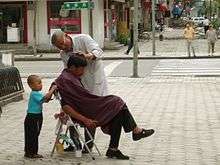barber
English

A barber cuts hair on the streets of Harbin, China.
Etymology
From Anglo-Norman barbour, from Old French barbeor, from barbe (“beard”), from Latin barba.
Pronunciation
- (UK) IPA(key): /ˈbɑː.bə/
- (General American) IPA(key): /ˈbɑɹ.bɚ/
Audio (US) (file) - Rhymes: -ɑː(ɹ)bə(ɹ)
Noun
barber (plural barbers)
- A person whose profession is cutting (usually male) customers' hair and beards.
- A barber surgeon, a foot soldier specializing in treating battlefield injuries.
- (Canada) A storm accompanied by driving ice spicules formed from sea water, especially one occurring on the Gulf of St. Lawrence; so named from the cutting ice spicules.
Synonyms
- hairdresser, hair-dresser
- hairstylist, hair-stylist
Derived terms
Terms derived from barber (noun)
Translations
person whose profession is cutting (usually male) customers' hair and beards
|
|
Verb
barber (third-person singular simple present barbers, present participle barbering, simple past and past participle barbered)
- To cut the hair or beard of (a person).
- (US, slang) To chatter, talk.
- 1940, Raymond Chandler, Farewell, My Lovely, Penguin 2010, p. 29:
- ‘I shouldn't ought to barber with you. But when I like a guy, the ceiling's the limit.’
- 1940, Raymond Chandler, Farewell, My Lovely, Penguin 2010, p. 29:
Translations
to cut the hair
Catalan
Further reading
- “barber” in Diccionari de la llengua catalana, segona edició, Institut d’Estudis Catalans.
French
Etymology
From barbe + -er; compare with familiar sense of raser which was its original meaning in Old French.
Pronunciation
- IPA(key): /baʁ.be/
Audio (file)
Verb
barber
- (familiar) to bore someone
- Le fait est qu'il ne perd aucune occasion de nous barber avec ses expériences dramatiques. (Claudel, Le Ravissement de Scapin, 1952)
Conjugation
Conjugation of barber (see also Appendix:French verbs)
| present participle | barbant /baʁ.bɑ̃/ | ||||||
|---|---|---|---|---|---|---|---|
| past participle | barbé /baʁ.be/ | ||||||
| infinitive | |||||||
| simple | barber | ||||||
| compound | avoir + past participle | ||||||
| gerund1 | |||||||
| simple | barbant /baʁ.bɑ̃/ | ||||||
| compound | ayant + past participle | ||||||
| singular | plural | ||||||
| first | second | third | first | second | third | ||
| indicative | je (j’) | tu | il, elle | nous | vous | ils, elles | |
| (simple tenses) |
present | barbe /baʁb/ |
barbes /baʁb/ |
barbe /baʁb/ |
barbons /baʁ.bɔ̃/ |
barbez /baʁ.be/ |
barbent /baʁb/ |
| imperfect | barbais /baʁ.bɛ/ |
barbais /baʁ.bɛ/ |
barbait /baʁ.bɛ/ |
barbions /baʁ.bjɔ̃/ |
barbiez /baʁ.bje/ |
barbaient /baʁ.bɛ/ | |
| past historic2 | barbai /baʁ.be/ |
barbas /baʁ.ba/ |
barba /baʁ.ba/ |
barbâmes /baʁ.bam/ |
barbâtes /baʁ.bat/ |
barbèrent /baʁ.bɛʁ/ | |
| future | barberai /baʁ.bə.ʁe/ |
barberas /baʁ.bə.ʁa/ |
barbera /baʁ.bə.ʁa/ |
barberons /baʁ.bə.ʁɔ̃/ |
barberez /baʁ.bə.ʁe/ |
barberont /baʁ.bə.ʁɔ̃/ | |
| conditional | barberais /baʁ.bə.ʁɛ/ |
barberais /baʁ.bə.ʁɛ/ |
barberait /baʁ.bə.ʁɛ/ |
barberions /baʁ.bə.ʁjɔ̃/ |
barberiez /baʁ.bə.ʁje/ |
barberaient /baʁ.bə.ʁɛ/ | |
| (compound tenses) |
present perfect | present indicative of avoir + past participle | |||||
| pluperfect | imperfect indicative of avoir + past participle | ||||||
| past anterior2 | past historic of avoir + past participle | ||||||
| future perfect | future of avoir + past participle | ||||||
| conditional perfect | conditional of avoir + past participle | ||||||
| subjunctive | que je (j’) | que tu | qu’il, qu’elle | que nous | que vous | qu’ils, qu’elles | |
| (simple tenses) |
present | barbe /baʁb/ |
barbes /baʁb/ |
barbe /baʁb/ |
barbions /baʁ.bjɔ̃/ |
barbiez /baʁ.bje/ |
barbent /baʁb/ |
| imperfect2 | barbasse /baʁ.bas/ |
barbasses /baʁ.bas/ |
barbât /baʁ.ba/ |
barbassions /baʁ.ba.sjɔ̃/ |
barbassiez /baʁ.ba.sje/ |
barbassent /baʁ.bas/ | |
| (compound tenses) |
past | present subjunctive of avoir + past participle | |||||
| pluperfect2 | imperfect subjunctive of avoir + past participle | ||||||
| imperative | – | – | – | ||||
| simple | — | barbe /baʁb/ |
— | barbons /baʁ.bɔ̃/ |
barbez /baʁ.be/ |
— | |
| compound | — | simple imperative of avoir + past participle | — | simple imperative of avoir + past participle | simple imperative of avoir + past participle | — | |
| 1 Only usable with preposition en. | |||||||
| 2 In less formal writing or speech, the past historic, past anterior, imperfect subjunctive and pluperfect subjunctive tenses may be found to have been replaced with the indicative present perfect, indicative pluperfect, present subjunctive and past subjunctive tenses respectively (Christopher Kendris [1995], Master the Basics: French, pp. 77, 78, 79, 81). | |||||||
Derived terms
References
- “barber” in le Trésor de la langue française informatisé (The Digitized Treasury of the French Language).
Further reading
- “barber” in le Trésor de la langue française informatisé (The Digitized Treasury of the French Language).
Norwegian Bokmål
This article is issued from
Wiktionary.
The text is licensed under Creative
Commons - Attribution - Sharealike.
Additional terms may apply for the media files.